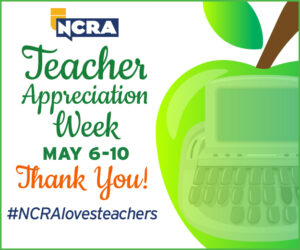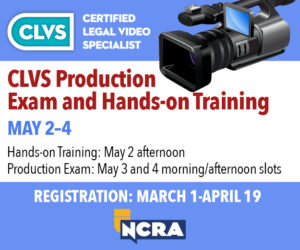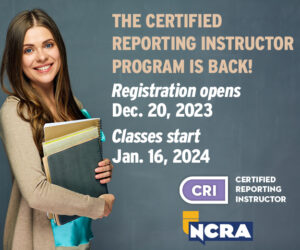Is one of your New Year’s resolutions to get your next certification? We have your guide for preparing for the exams. The February issue of the JCR includes a candidate handbook with information on all the certifications. Review the specific certification you’re studying for in the handbook to find out what to expect.
4 – 6 months before
Decide which certification you want to earn this year. Some of the exams take more preparation than others. The CLVS certification, for example, has a two-day instructional seminar that is only offered twice a year, in the spring and the fall.
Begin studying. The testing department has put together a job analysis for each certification. The job analysis discusses the purpose and benefits of the certification, as well as required skills and knowledge, including recommended study materials. These are available online without cost at www.ncra.org/testing. Candidates who are studying for the RPR or RMR exams can also purchase speedbuilding CDs and downloads through the NCRA store.
Perhaps this is also an opportunity to encourage a friend who has been meaning to earn his or her own certifications. Set up a schedule and challenge each other. Swap study and practice material.
Now is also the time to think about when you want to take your tests. Registration opens a few months before the test dates, but it helps to register early.
2 – 4 months before
If you haven’t yet, register for your exam. This is a good time to double-check what name you used for your NCRA membership. Names will need to match exactly. If you were married in the past year and changed your legal name, for example, this would be a good time to make sure you’ve changed the name on both your identification and your NCRA membership.
Once you register, you should expect a confirmation within three business days. If your certification includes a written knowledge test component (RPR, RDR, CBC, CCP, CLVS), you can then schedule your WKT – locations can fill up early! If you will need special accommodations, put in those requests to the testing department.
If you want the depth of your keys changed before you start the exam, schedule that now. Your fingers will get used to the new depth as you continue practicing.
Check your progress according to your study/practice plan. Are you on track? If you’re having a hard time practicing on your own, find a court reporting school nearby and see if you can practice with some of the classes. You might inspire some of the students!
1 – 2 months before
This is a good time to make sure you’re comfortable with your equipment. This is especially important for certifications that require specialized technical knowledge, like the CBC, CCP, and CLVS exams. Practice setting up with your main equipment and your back-up equipment. If anything needs to be added or replaced, do it now so you can become familiar with it. This is also true of software.
Try a practice test online. NCRA is partnered with myRealtimeCoach for online testing. You can set up your computer, CAT software, and Internet settings (and save them!). The practice text will also give you a score and feedback on mistakes. Use the username and password provided to you when you registered for the exam.
Build your dictionary. Keep track of common mistakes and develop briefs to help you avoid those on test day.
1 week – 1 month before
Make sure you know how to get to the testing site. If possible, do a test drive so you are comfortable with the route, traffic patterns, and parking.
Work out those test nerves. Find ways to encourage yourself and build confidence. Also, make sure you’re taking care of yourself. If you feel your best, you’ll be able to do your best.
Keep practicing!
1 day before
Check your email inbox and the exam site information page on NCRA’s testing website for any last-minute updates or changes.
Pack your bag with the materials you need to bring to your test. Double check that you have all the appropriate equipment, including back-ups if necessary. Also make sure that you have your identification, your confirmation email, and your chief examiner contact information (found on the NCRA testing website).
Get a good night’s sleep! Good luck!









